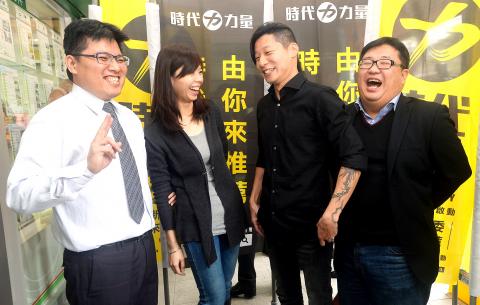The New Power Party (NPP) yesterday kept to its promise to bring fresh faces to next year’s legislative elections by adding two more political newcomers to its list of candidates — Freddy Lim (林昶佐) and Hung Tzu-yung (洪慈庸).
Hung, 32, gained national recognition after the 2013 death of her brother — army corporal Hung Chung-chiu (洪仲丘) — triggered an avalanche of protests demanding better protection of human rights in the military, while Lim, 39, is the lead vocalist of heavy metal band Chthonic and former chair of Amnesty International’s Taiwan chapter.
The duo announced their candidacy at a small breakfast store in Taipei yesterday morning to symbolize their belief that politics “should not be viewed as something distant and removed from our everyday lives.”

Photo: Lin Cheng-kung, Taipei Times
“Ever since my brother’s incident, we have been helped by many people who stood with us on our quest for fairness and justice,” Hung Tzu-yung said, adding that as a political outsider, she initially struggled with her decision to enter politics.
“It is my hope that whenever we encounter difficulties, we will not bow to fate or give up easily,” she added.
Hung Tzu-yung won praise for her leading role in the campaign following the death of her brother, in which she led more than 200,000 protesters in a march to demand more transparency in the military’s investigative efforts.
Their decision pits Hung Tzu-yung against Chinese Nationalist Party (KMT) Legislator Yang Chiung-ying (楊瓊瓔) in Taichung’s third electoral district — which includes the city’s northern Tanzi (潭子), Daya (大雅), Shengang (神岡) and Houli (后里) districts, while Lim is set to challenge KMT Legislator Chiang Nai-hsin (蔣乃辛) in Taipei’s Daan District (大安).
Despite Daan’s reputation as a KMT stronghold, Lim said that his decision to run there came “naturally,” as he was born and raised in the area.
Amid an explosion of candidates from minor parties entering the race, Lim could find himself competing for votes with the Social Democratic Party’s (SDP) Fan Yun (范雲), a professor of sociology at National Taiwan University, who is reportedly considering running in Daan.
The launch of two activist parties — the SDP and the NPP — was the result of a split in civic group Taiwan Citizen’s Union, after its members encountered irreconcilable differences regarding its legislative nomination mechanism.
Academia Sinica researcher Huang Kuo-chang (黃國昌), who played a leading role in the Sunflower movement protests last year, said that he fully supported the NPP’s cause of pursuing reform in the legislature.
Huang said the two latest NPP candidates showed courage, as they differed from many local candidates who received backing from local “political dynasties” or large business conglomerates.
According to a report by the Liberty Times (the Taipei Times’ sister paper) last month, Hung Tzu-yung’s uncle, Hu Shih-ho (胡世和), is also considering running as an independent in New Taipei City’s Sinjhuang District (新莊).
Lim and Hung Tzu-yung’s decision to enter the race followed on the heels of human rights lawyers Hu Po-yen (胡博硯) and Chiu Hsien-chih (邱顯智) — both attorneys in the Hung Chung-chiu case — who announced their decision to run on the NPP ticket last week.

A preclearance service to facilitate entry for people traveling to select airports in Japan would be available from Thursday next week to Feb. 25 at Taiwan Taoyuan International Airport, Taoyuan International Airport Corp (TIAC) said on Tuesday. The service was first made available to Taiwanese travelers throughout the winter vacation of 2024 and during the Lunar New Year holiday. In addition to flights to the Japanese cities of Hakodate, Asahikawa, Akita, Sendai, Niigata, Okayama, Takamatsu, Kumamoto and Kagoshima, the service would be available to travelers to Kobe and Oita. The service can be accessed by passengers of 15 flight routes operated by

Alain Robert, known as the "French Spider-Man," praised Alex Honnold as exceptionally well-prepared after the US climber completed a free solo ascent of Taipei 101 yesterday. Robert said Honnold's ascent of the 508m-tall skyscraper in just more than one-and-a-half hours without using safety ropes or equipment was a remarkable achievement. "This is my life," he said in an interview conducted in French, adding that he liked the feeling of being "on the edge of danger." The 63-year-old Frenchman climbed Taipei 101 using ropes in December 2004, taking about four hours to reach the top. On a one-to-10 scale of difficulty, Robert said Taipei 101

MORE FALL: An investigation into one of Xi’s key cronies, part of a broader ‘anti-corruption’ drive, indicates that he might have a deep distrust in the military, an expert said China’s latest military purge underscores systemic risks in its shift from collective leadership to sole rule under Chinese President Xi Jinping (習近平), and could disrupt its chain of command and military capabilities, a national security official said yesterday. If decisionmaking within the Chinese Communist Party has become “irrational” under one-man rule, the Taiwan Strait and the regional situation must be approached with extreme caution, given unforeseen risks, they added. The anonymous official made the remarks as China’s Central Military Commission Vice Chairman Zhang Youxia (張又俠) and Joint Staff Department Chief of Staff Liu Zhenli (劉振立) were reportedly being investigated for suspected “serious

Taiwanese and US defense groups are collaborating to introduce deployable, semi-autonomous manufacturing systems for drones and components in a boost to the nation’s supply chain resilience. Taiwan’s G-Tech Optroelectronics Corp subsidiary GTOC and the US’ Aerkomm Inc on Friday announced an agreement with fellow US-based Firestorm Lab to adopt the latter’s xCell, a technology featuring 3D printers fitted in 6.1m container units. The systems enable aerial platforms and parts to be produced in high volumes from dispersed nodes capable of rapid redeployment, to minimize the risk of enemy strikes and to meet field requirements, they said. Firestorm chief technology officer Ian Muceus said